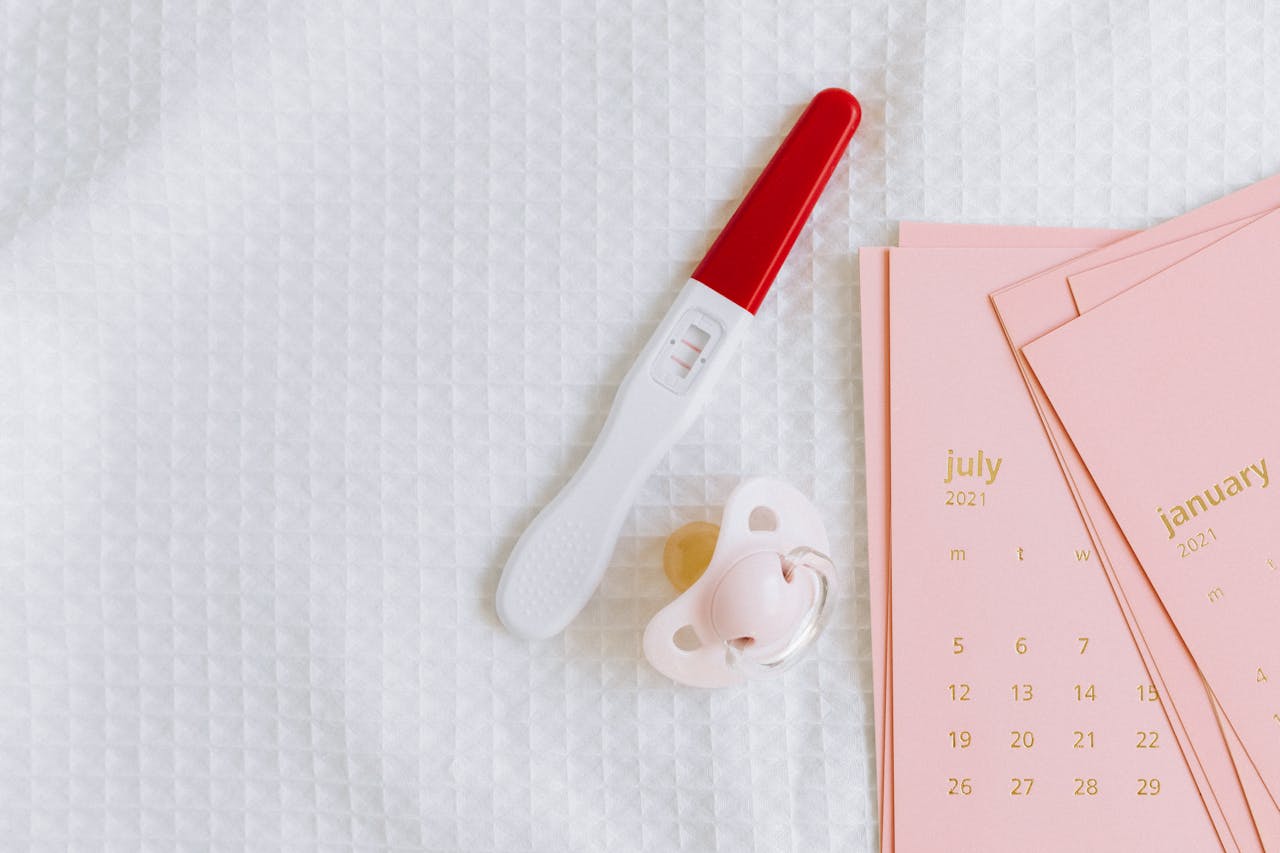Can ovarian cysts cause infertility? What you need to know

Wondering if ovarian cysts affect your chances of getting pregnant? Learn about different types of cysts, their impact on fertility, symptoms to watch for, and when to seek treatment.
Ovarian cysts are a common finding in women of reproductive age. In many cases, they’re harmless, cause no symptoms, and resolve independently. But, for women who are trying to conceive or planning for the future, a diagnosis of an ovarian cyst can raise concerns, especially about fertility.
Can ovarian cysts cause infertility? Do they affect your chances of getting pregnant? The short answer is: it depends. While many types of cysts are benign and don’t interfere with fertility, others may complicate your ability to conceive.
In this article, we’ll break down the different types of ovarian cysts, explore common causes, and discuss how they may impact fertility.
{{button}}
What are ovarian cysts?
According to the American College of Obstetricians and Gynecologists (ACOG), an ovarian cyst is a “sac or pouch filled with fluid or other tissue that forms in or on an ovary”.
Ovarian cysts are fairly common, especially during the reproductive years, and many women will have cysts without even knowing it.
There are several types of ovarian cysts:
Functional cysts: The most common type of ovarian cysts, they can develop during the menstrual cycle. The cyst itself usually causes no symptoms and resolves on its own within 6 to 8 weeks. They include:
Follicular cysts: form when a follicle doesn’t release an egg.
Corpus luteum cysts: form after the egg is released and the follicle reseals and fills with fluid.
Endometriomas: Caused by endometriosis, can affect fertility and may need removal.
Cystadenomas: A benign (non-cancerous) tumour that grows on the outer surface of the area. They can grow very large.
Teratoma: This is a type of cyst that contains different kinds of tissues, such as skin or hair. They are usually benign but in rare cases can become cancerous.
What causes ovarian cysts?
Ovarian cysts are caused by several factors, some of which are physiological and pose no danger. However, some cysts are associated with underlying health conditions that may affect fertility. Here are the most common causes of ovarian cysts:
Ovulation: Functional cysts, the most common kind, occur as a natural part of the menstrual cycle. When an ovary doesn’t release an egg, or the empty follicle doesn’t shrink as expected, a cyst can form.
Polycystic Ovary Syndrome (PCOS): PCOS is a hormonal disorder where the ovaries contain multiple small immature follicles that often don’t release eggs regularly. These cyst-like structures are a hallmark of the condition and PCOS can lead to irregular, or no, ovulation. PCOS is the leading cause of female infertility.
Endometriosis: In this condition, tissue similar to the uterus lining grows outside of it. If it attaches to an ovary it can form an endometrioma, a type of cyst. Endometriosis can significantly affect fertility.
Pelvic infections: Severe infections inside your uterus can spread to your ovaries and cause cysts.
Other conditions: Abnormal cell reproduction can cause benign teratomas or cystadenomas and in rare cases, malignant (cancerous) growths. Some medications, like the fertility medication clomiphene, increase your chances of developing ovarian cysts.
Symptoms of ovarian cysts
Many ovarian cysts are small and don’t cause any noticeable symptoms and are picked up during pelvic imaging for other issues. However, some cysts can cause symptoms, especially if they grow large, rupture, or twist (a serious condition called ovarian torsion.)
Common symptoms may include:
Pelvic pain: This can range from a dull ache to a sharp stabbing-like pain that usually occurs on one side of the lower tummy. Seek urgent medical advice for any severe abdominal pain.
Bloating or fullness: Large cysts can cause you to feel permanently bloated or a sense of pressure or heaviness in the tummy.
Pain during sex: Pain or discomfort particularly with deep penetration. ● Pain during bowel movements or urination: Pain when trying to open your bowels or when passing water.
Menstrual irregularities: Heavier, lighter, or missed periods.
Increased need to pee: This can occur if the cyst is large and pressing on the bladder ● Sudden, severe abdominal pain: This can signal a medical emergency such as a ruptured cyst or ovarian torsion.
Nausea or vomiting: Alongside tummy pain this can indicate ovarian torsion or cyst rupture.
Can ovarian cysts cause infertility?
Do ovarian cysts cause infertility? The short answer is: it depends on the type of cyst, the size, and if it's a sign of an underlying medical condition.
Most ovarian cysts, especially functional cysts, are harmless and don’t interfere with fertility. They usually disappear on their own within a few weeks and won’t affect your ovulation or ability to conceive.
However, certain types of ovarian cysts can be linked to conditions that do impact fertility, including:
Endometriomas: These cysts are caused by the condition endometriosis. Endometriomas can impact ovarian function and interfere with egg quality and ovulation, stopping you from getting pregnant. Between 30-50% of women with endometriosis will experience infertility.
Polycystic ovaries (in PCOS): In PCOS the ovaries may contain multiple small, immature cyst-like follicles. The hormonal imbalance can cause irregular ovulation or prevent it altogether, leading to infertility.
Large or complex cysts: While not all large cysts affect fertility, those that grow big enough may interfere with ovulation, cause symptoms, or require removal to prevent complications like ovarian torsion.
Ovarian cysts and getting pregnant
One of the most common questions women ask after being diagnosed with a cyst is “Can I still get pregnant?”. In many cases, the answer is yes.
Most cysts don’t interfere with ovulation (the release of an egg by the ovary) and therefore won’t affect your chances of getting pregnant. However, in some cases, they may indicate an underlying condition like PCOS or endometriosis that may impact fertility.
Chances of getting pregnant with ovarian cysts
For most women, especially those with functional cysts, the chances of getting pregnant with ovarian cysts are the same as if they do not have a cyst. According to the British Health Service (NHS), if you’re under 40 and having regular unprotected sex, there is an 80% chance you will get pregnant within 1 year.
Here are some factors that may affect your chances:
Underlying PCOS or endometriosis: Although it is possible to get pregnant naturally with either of these conditions, some women may find it harder to conceive and require additional support.
Size of cysts: Very large cysts can impact ovulation or affect egg quality, especially if surgery is required and the ovary has to be removed.
Age: Age is the biggest factor affecting a woman’s chances of conceiving. Over 30 fertility starts to decline and that decline speeds up after the age of 35.
Ovulation: Irregular or absent periods can be caused by many factors and are a sign that your body is not ovulating regularly. If no egg is being released then it will not be possible to get pregnant.
When to seek medical advice
You should seek medical advice if you have any of the symptoms of an ovarian cyst, or if you’re having irregular periods or difficulty getting pregnant.
If you have any of the following symptoms then you should seek urgent medical advice as they could be a sign of a medical emergency like ovarian torsion or cyst rupture:
- Sudden or severe tummy or pelvic pain
- Pain in your tummy accompanied by nausea or vomiting
- Unexpected vaginal bleeding
- Dizziness, weakness, or feeling generally very unwell
Good to know
According to the ACOG, experts recommend infertility evaluation if you have been having regular unprotected sex and are:
- Under 35 and have been trying for longer than 12 months
- Age 35-40 and have been trying for longer than 6 months
- Over 40 and are considering getting pregnant
Treatment options and fertility preservation
Treatment for ovarian cysts depends on the type, size, symptoms, and whether you're trying to get pregnant. Most cysts don’t require treatment, but some may need monitoring or intervention, especially if they affect fertility.
Possible treatment options include:
Watchful waiting: Many cysts resolve on their own and just need follow-up ultrasounds. ● Hormonal birth control: Helps prevent the formation of new cysts (not used if you're trying to conceive).
Surgery: Laparoscopy or laparotomy may be needed for large, persistent, or complex cysts.
Fertility-preserving surgery: Surgeons aim to remove the cyst while keeping as much healthy ovarian tissue as possible.
Key takeaways
- Ovarian cysts are common and don’t usually cause infertility.
- The most common type of cyst is functional cysts. These resolve on their own and don’t affect fertility.
- Sometimes an ovarian cyst can be caused by an underlying medical condition, like PCOS or endometriosis, that may impact fertility.
- Very large cysts can sometimes impact ovulation and reduce the chances of conceiving and may require surgical removal.
- Seek medical advice if you experience any of the symptoms of ovarian cysts.
{{pink-banner}}








.avif)
